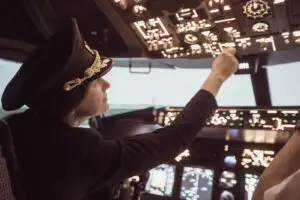
The Federal Aviation Administration (FAA) regulates pilots. The agency requires them to pass knowledge exams and complete flight training. Pilots must also be certified healthy to fly and obtain and maintain a medical certificate verifying their physical and mental fitness.
While most drivers are not pilots, most pilots are drivers. Getting a DUI can be an issue for someone seeking a pilot’s license or wanting to maintain a current license. A DUI suggests there might be a substance use problem, and substance abuse or dependence is a disqualifying medical condition.
A DUI is a serious legal matter that can have severe consequences. A good defense can minimize or eliminate the effect a DUI may have on the ability to get a pilot’s license. Contact a Los Angeles DUI lawyer for help after a DUI arrest.
A DUI Can Affect Obtaining a Pilot’s Medical Certificate
The FAA is concerned about a pilot or applicant with a DUI not so much as a violation of the law but as an indication that the issue of substance use may need further investigation. The circumstances of the DUI and the level of intoxication are relevant in evaluating the use of substances.
To obtain a medical certificate, a pilot or applicant is examined by an Aviation Medical Examiner (AME). Prior to the examination, an application for medical certification must be completed.
In the medical history portion, the applicant must disclose any current or previous substance abuse or dependence. An applicant is also required to disclose any alcohol or drug offense for which there was an arrest, conviction, or administrative action taken.
Detailed information about each offense must be provided, as well as information about current alcohol or drug use and any treatment or recovery programs that were completed. Blood alcohol concentration (BAC) results and court records are also required.
The FAA then uses the information gathered by the AME to determine whether the pilot applicant has a disqualifying substance use condition according to their standards for abuse or dependence.
FAA Standards for Evaluating Substance Dependence or Abuse
The FAA will look for the following indications to determine substance dependence:
- High tolerance
- Withdrawal symptoms if use stopped
- Inability to control usage
- Continued use despite damage to health or impairment of social and occupational functions
Any of the following determinations may indicate substance abuse:
- The substance is used when it is physically hazardous
- Blood alcohol test results show a concentration of at least .04
- Refusal to submit to blood alcohol testing
- Misusing a substance that the Federal Air Surgeon has determined to render a person unable to perform the necessary duties of a pilot safely
How the FAA Can Find Out About a DUI
Failing to disclose a DUI and hoping the FAA won’t find out about it could get you worse results than just having a DUI. If the FAA finds out about a DUI that was not disclosed, it is grounds to deny or revoke the medical certification.
Completing the medical certificate application includes authorizing the National Driving Register to release the applicant’s driving record to the FAA. The FAA also has a hotline where people can anonymously report matters that may affect aviation safety.
Pilot Duty to Report DUI
Licensed pilots arrested for DUI must report the event to the FAA within 60 days of the effective date of either an administrative action affecting their driver’s license or a conviction.
License suspension is an administrative action that can be taken by the California Department of Motor Vehicles (DMV) after a DUI arrest. The suspension becomes effective 30 days from the date issued if no action is taken.
Pilots who receive license suspension orders can request a hearing within 10 days to challenge the suspension and toll the effective date. If successful, a pilot may be able to postpone notifying the FAA and avoid immediate consequences restricting their flying privileges.
California pilots should contact a Los Angeles DUI attorney as soon as possible after a DUI arrest to ensure their rights are fully protected.
Can the FAA See Expunged Records?
While expungement typically removes a DUI conviction from public record and may restrict access by most employers and background check agencies, government agencies, including the FAA, will likely see your expunged record.
Even if a conviction has been expunged, pilots are required to report any DUI charges, arrests, or convictions to the FAA during the application process or regular medical certificate renewals.
The FAA conducts thorough background checks and can find information about past DUI incidents. Consult an experienced lawyer to learn more about expungement.
Your Right to Appeal Denial of a Medical Certificate
An FAA medical certificate denial is not the end of the road for an applicant with a DUI. A denial based on a disqualifying medical condition can be appealed in two ways.
Persons who want to pursue an unrestricted medical certificate can appeal the FAA’s decision to the National Transportation Safety Board (NTSB). A petition for review must be filed within 60 days of the FAA’s denial.
If it is not possible to qualify for an unrestricted medical certificate, it may be possible to get a special issuance medical certificate. A special issuance medical certificate is issued at the discretion of the FAA, and the NTSB has no authority to review the determinations. The special certificate is issued only if the FAA is convinced there is no risk to public safety.
What Statistics Say About Alcohol Use Based on Age
A study conducted by the LA County Department of Public Health in October 2022 shed light on the differing rates of alcohol consumption within various age demographics across Los Angeles County (LAC) over the preceding 30 days.
Notably, among individuals aged 12 to 17, the rate stood at 9%, indicating a relatively lower prevalence of alcohol use within this age group. However, there was a significant increase in alcohol consumption among older age groups, with rates soaring to 54% among those aged 18 to 25 and 55% among individuals over 26.
These findings underscore a considerable escalation in alcohol use prevalence as individuals age. However, to Los Angeles DUI lawyers, you are more than just a statistic; they genuinely want to help rebuild your life.
A Los Angeles DUI Attorney Can Help You Become a Pilot
DUI arrests or convictions are serious events that can keep pilots and aspiring pilots grounded. However, depending on the circumstances and what has been done since the event, a DUI does not have to become a disqualifying medical condition.
If it can be successfully demonstrated to the FAA that there is no alcohol or drug dependence or abuse, an applicant should be able to obtain a medical certificate and pilot’s license.
When your livelihood may be on the line, you need every legal advantage. An experienced DUI attorney familiar with federal regulations can help you convince the FAA of your fitness to fly. Learn what can be done about your DUI and getting your pilot’s license. Contact us to schedule a free consultation with a Los Angeles DUI lawyer.






